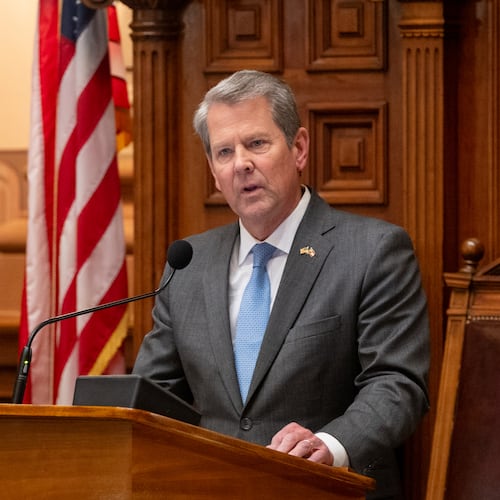The Georgia Senate on Monday voted to let bail bondsmen hold local elected office, a measure aimed at making it easier to recruit candidates in rural counties that sometimes have a dearth of prospective politicians.
The vote is the first bill to pass one chamber of the Georgia Legislature this year in a session that has gotten off to a slow start. After organizing themselves earlier this month, lawmakers essentially lost a week of work because of a snowstorm that canceled a series of important budget hearings.
This bill concerns an obscure section of law about who can hold elected office. When people get arrested and can’t afford bail, they often hire a bail bond company to pay it for them. The defendants pay these companies a fee, typically about 10% of the total bail.
Local officials, including county commissioners, control the budgets for sheriffs’ departments and local jails. That’s why Georgia law bans them from holding elected office, for fear that they could use the budget to pressure local law enforcement authorities to steer business to their companies.
Most people don’t know about the bail bond ban, including the voters of Heard County. In November, they elected the owner of a local bail bond company to the county commission. But before Angie Stephens McCullough could take office, she learned about the law disqualifying her. Instead of giving up her company, she opted not to take office.
State Sen. Matt Brass, R-Newnan, heard about this and wanted to change the law. He introduced Senate Bill 16, which would make it OK for bail bond business owners to be elected to a city council or a county commission. (There is already an exception for school board members.) The law would still ban these officials from issuing bail bonds within the county or city they represent, which isn’t the case for McCullough because her bond business is in neighboring Coweta County.
Brass said it’s hard sometimes to find people willing to run for office in some sparsely populated places. Heard County has about 12,000 people in it. Stephens did not face opposition in November, but she defeated two other people during the Republican primary, which attracted less than 300 votes.
“When you get into rural areas … you just don’t have the population of folks that necessarily would want to run,” Brass said. “Anything we can do to help deepen that bench, that’s what we’re looking to do.”
While SB 16 is the first bill to pass either chamber, the pace has been picking up.
Republican Gov. Brian Kemp unveiled his proposal last week aimed at limiting large jury awards in certain civil cases, a push that is sure to prompt fierce debate throughout the Capitol. And a state Senate committee took its first vote last week on a bill that would ban transgender athletes from competing in women’s sports.
Monday’s vote, however, lacked tension. The Senate passed it 51-2, sending it to the House of Representatives to review. If the House approves it with no changes, it would be up to Kemp to decide whether to sign it into law.
But the bill came too late to help McCullough. The District 1 seat on the Heard County Commission is vacant for now, and the local election commission has scheduled a special election for March 18. If the legislature passes the bill in time, McCullough said she plans to run again.
“I have fought so hard to get this law changed this Legislature so that I can continue to serve our District!!” she posted on Facebook. “March 18th … I need your support one more time!”
About the Author
Keep Reading
The Latest
Featured




